Skip to comments.
Rome, Her Saints, & the Gospel
The Cripplegate ^
| May 20, 2015
| Eric Davis
Posted on 05/28/2015 8:12:00 AM PDT by RnMomof7
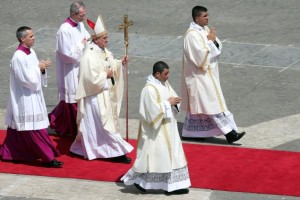 This past weekend pope Francis canonized four new saints in a ceremony which received extra attention as two of the four were of Palestinian origin. One of the new Palestinian saints, Sister Mariam Baouardy (1846-1878), was a mystic and stigmatic also known as “Mary Jesus Crucified.” She was a Palestinian and foundress of the Discalced Carmelites of Bethlehem in the late 1800’s. The other new Palestinian saint, Sister Marie Alphonsine Danil Ghattas (1843-1927), was a co-founder of the Congregation of the Rosary Sisters, who spent much of her life in Bethlehem founding schools and orphanages.
This past weekend pope Francis canonized four new saints in a ceremony which received extra attention as two of the four were of Palestinian origin. One of the new Palestinian saints, Sister Mariam Baouardy (1846-1878), was a mystic and stigmatic also known as “Mary Jesus Crucified.” She was a Palestinian and foundress of the Discalced Carmelites of Bethlehem in the late 1800’s. The other new Palestinian saint, Sister Marie Alphonsine Danil Ghattas (1843-1927), was a co-founder of the Congregation of the Rosary Sisters, who spent much of her life in Bethlehem founding schools and orphanages.
Despite the interesting politics of the situation, we will stick to commenting on the theological issues. What is a saint? How does one become a saint? And what is Rome doing when they canonize someone?
First, a brief theology on Roman Catholicism’s view of the saints.
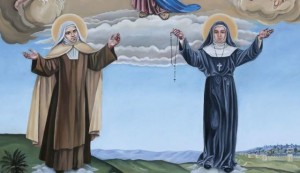 The term canonization refers to a decree that is binding on the Universal Church issued from the pope which commands the public ecclesiastical veneration of an individual.
The term canonization refers to a decree that is binding on the Universal Church issued from the pope which commands the public ecclesiastical veneration of an individual.
Rome’s criteria for recognizing an individual as a saint involves a few steps. First, the person’s life is evaluated to determine if, according to Rome, they possessed orthodox doctrine and heroic virtue, normally a number of years after death. Upon Rome’s approval, the individual is considered “venerable.” Then, the nominee is typically beatified, on the condition that a miracle occurred after the individual’s death and consequent of petition to that individual. According to Rome, this ensures that the saint-candidate is both in heaven and able to intercede for those who pray to them. At this point, the individual is permitted by Rome to be beatified, though not yet canonized. Finally, the candidate will be declared a saint upon Rome’s determination that they performed a second miracle. It should be noted that typically only the saints are said to be in heaven for certain. “The title of saint tells us that the person lived a holy life, is in heaven, and is to be honored by the universal Church” (http://www.catholic.org/saints/faq.php). Saints are thought to be special friends and servants of God whose holy lives have made them worthy of his special love. Once the pope canonizes the individual, the declaration is infallible and irrevocable.
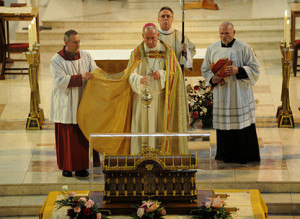 Saints are officially venerated throughout the year. “All Saints’ Day” falls on November 1 and, according to Urban IV, was created “to supply any deficiencies in the faithful’s celebration of saints’ feasts during the year.” Many of the saints have specific days set for their veneration. A look at the Roman Catholic saint calendar is simply exhausting due to the sheer quantity of saint holidays. For example, today (May 20th) venerates St. Bernadine of Sienna, the patron saint of gambling, due to his preaching against the practice. June 13th venerates St. Anthony of Padua, the patron saint of lost items, to whom some Catholics are taught to pray, “Dear St. Anthony, come around, something is lost and can’t be found.”
Saints are officially venerated throughout the year. “All Saints’ Day” falls on November 1 and, according to Urban IV, was created “to supply any deficiencies in the faithful’s celebration of saints’ feasts during the year.” Many of the saints have specific days set for their veneration. A look at the Roman Catholic saint calendar is simply exhausting due to the sheer quantity of saint holidays. For example, today (May 20th) venerates St. Bernadine of Sienna, the patron saint of gambling, due to his preaching against the practice. June 13th venerates St. Anthony of Padua, the patron saint of lost items, to whom some Catholics are taught to pray, “Dear St. Anthony, come around, something is lost and can’t be found.” 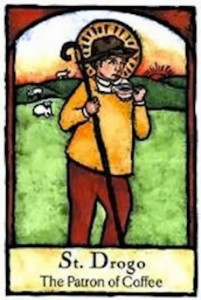 There are others, for example, St. Genesius (the patron saint of theatrical performers), St. Francis Borgia (the patron saint of earthquakes), St. Teresa of Avila (patron saint of headaches), St. Isidore of Seville (the patron saint of the internet), St. Apollonia (the patron saint of toothaches), St. Fiarce (patron saint of taxi drivers), and, my personal favorite, St. Drogo (the patron saint of unattractive people and coffee). In case one struggles to remember which saint is to be venerated on which day, a “Saint of the Day” smart phone app has been created to assist with that.
There are others, for example, St. Genesius (the patron saint of theatrical performers), St. Francis Borgia (the patron saint of earthquakes), St. Teresa of Avila (patron saint of headaches), St. Isidore of Seville (the patron saint of the internet), St. Apollonia (the patron saint of toothaches), St. Fiarce (patron saint of taxi drivers), and, my personal favorite, St. Drogo (the patron saint of unattractive people and coffee). In case one struggles to remember which saint is to be venerated on which day, a “Saint of the Day” smart phone app has been created to assist with that.
Additionally, prayers are to be offered both by the saints and to the saints. In other words, the saints can pray for you, as well as be prayed to by you.
But, despite the profuse teaching, the Roman Catholic doctrine of the saints violates Scripture on several crucial points. Here are a few of them:
- The headship of the church belongs to Christ alone.
Rome’s practice of canonization is largely an authority issue. In Roman Catholic teaching, the pope is considered head of the church and vicar of Christ, among other things. As such, he is thought to have the final say on matters such as who is and is not a saint. His act of canonization is said to be infallible, irrevocable, and universally binding. These pronouncements are fundamentally rooted in the authority and headship said to rest in the pope.
However, Scripture teaches that Christ is the perpetual head of the church. “And He put all things in subjection under His feet, and gave Him as head over all things to the church, which is His body, the fullness of Him who fills all in all” (Eph. 1:22-23). As such, he alone has the authority to declare who is in heaven, who is not, and who are saints, and who are not.
- Prayer is to be directed towards God alone.
If God’s people were to pray to the saints, certainly Scripture would teach that. But the overwhelming testimony of Scripture teaches that prayer be directed towards God. For example, when Christ taught us how to pray, he instructed us to pray to God: “But when you pray…pray to your Father…” (Matt. 6:6), “Pray, then, in this way: ‘Our Father who is in heaven…’” (Matt. 6:9), and, “…will not God bring about justice for His elect who cry to Him…” (Luke 18:7). In each of these teachings, we are instructed to pray to God.
The Apostle Paul instructed that we pray to God: “Be anxious for nothing, but in everything by prayer and supplication with thanksgiving let your requests be made known to God” (Phil. 4:6).
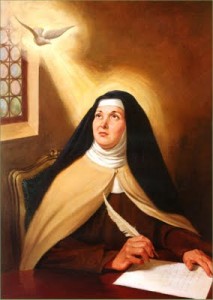 The biblical examples of prayer describe prayer being directed towards God alone. Not one prayer in the Psalms is directed towards the dead. Further, both Jesus (e.g. John 11:41, 17:1) and the Apostles prayed only to God (e.g. Acts 1:24, 4:24, 16:25).
The biblical examples of prayer describe prayer being directed towards God alone. Not one prayer in the Psalms is directed towards the dead. Further, both Jesus (e.g. John 11:41, 17:1) and the Apostles prayed only to God (e.g. Acts 1:24, 4:24, 16:25).
Rome argues that God’s people ought to ask the dead saints to pray for them on the grounds that we ask living people to pray for us. But there is a problem with that: we can speak with the living, but we are forbidden to do so with the dead (Deut 18:10-12). “And when they say to you, ‘Inquire of the mediums and the necromancers who chirp and mutter,’ should not a people inquire of their God? Should they inquire of the dead on behalf of the living?” (Isa. 8:19). Prayer is to be directed only to God.
- Veneration is to be directed towards God alone.
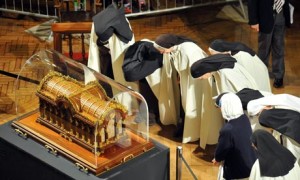 Rome argues that there is nothing wrong with honoring the saints since we honor the living. However, Rome teaches that the saints are to be given more than honor. When a saint is canonized, the church is under mandate, by papal infallibility, to venerate them. Combine that with the act of praying to the saints, and the consequence is idolatry, which Scripture condemns (Exod. 20:4-5, Matt. 4:10). Whether or not Rome explicitly affirms the worship of the saints, the actions are clear enough.
Rome argues that there is nothing wrong with honoring the saints since we honor the living. However, Rome teaches that the saints are to be given more than honor. When a saint is canonized, the church is under mandate, by papal infallibility, to venerate them. Combine that with the act of praying to the saints, and the consequence is idolatry, which Scripture condemns (Exod. 20:4-5, Matt. 4:10). Whether or not Rome explicitly affirms the worship of the saints, the actions are clear enough.
- People are made saints by faith in the Person and work of Christ alone.
The most serious issue with Rome’s teaching on the saints relates to the biblical gospel of Jesus Christ. Rome teaches that saints are really the only individuals who can have the assurance of heaven, and have been granted that status through extraordinary morality and miracles. For that, Rome’s doctrine of the saints commits grievous error.
The title, “saint,” does not refer to an elite Christian, but every Christian. For example, the Apostle Paul referred to everyone in the churches at Rome (Rom. 1:7), Ephesus (Eph. 1:1), and Philippi (both lay people and deacons and elders) as “saints” (Phil. 1:1). And, perhaps outrageously from a human standpoint, the Apostle referred even to the regenerate Corinthians as “saints” (1 Cor. 1:2).
How in the world could sinful and simple, nobodies across the Roman Empire be considered saints?
Contrary to Rome, it is not our works that merit the status of sainthood and entrance into heaven with God. “Saint” is a God-given title to all who have been justified by faith alone in the Person and substitutionary work of Jesus Christ. God placed the full penalty of our sin on the sinless Christ when he died on the cross. Consequently, the most flagrant sinner may be declared a saint and in the right with God by faith alone in Christ alone. We become a saint, not by our valiant display of deeds, but by the vicarious death of Christ. Every ounce of God’s wrath due sinners was turned to Christ such that we can rest in our standing as saints of Christ and the assurance of heaven to come. Sinners become saints, not by heroic works, but humble faith. You do not need extraordinary virtue to secure sainthood with God, but an extraordinary Savior.
“Therefore, since we have been justified by faith, we have peace with God through our Lord Jesus Christ” (Rom. 5:1).
Along with being biblically unsubstantiated, Rome’s teaching on the saints contradicts Scripture on some of the most fundamental doctrines of Christianity. In light of these serious biblical errors, it must be rejected.
TOPICS: Apologetics; Evangelical Christian; Theology; Worship
KEYWORDS: canonization; lies; moacb; prayer; rome; saints; strawman; stupid
Navigation: use the links below to view more comments.
first previous 1-20, 21-40, 41-60, 61-80 ... 161-178 next last
To: MamaB
In public grammar school, we would stand, say the pledge allegiance, and pray the "Lord's Prayer"
(oops... I just opened a can of worms... IT'S A MODEL PRAYER! ) Anyway, I took pride while saying the prayer when I came to end of the prayer before the Prots! I was very proud of my RCC commitment to say it "RIGHT!" - not like the other half of the class.
I'd actually TRY to make my silence LOUDER - as if that was possible.
41
posted on
05/28/2015 3:49:24 PM PDT
by
kinsman redeemer
(The real enemy seeks to devour what is good.)
To: kinsman redeemer
... now I’ll try to focus on the ACTUAL SUBJECT of the thread.
42
posted on
05/28/2015 3:50:09 PM PDT
by
kinsman redeemer
(The real enemy seeks to devour what is good.)
To: ealgeone; CynicalBear; MamaB; RnMomof7
Would love for the catholic to show us where this is squared away with the Word. I'll start painting my house while we wait.
You can paint the town if you like, but you will still have time left over to continue your wait.
43
posted on
05/28/2015 4:08:36 PM PDT
by
Mark17
(Through all my days, and then in Heaven above, my song will silence never, I'll worship Him forever)
To: safeasthebanks
The Pharisees were perfect according to keeping the Law.
Jesus called them whitewashed tombs.
Some people can put on a really good show.
44
posted on
05/28/2015 4:21:08 PM PDT
by
metmom
(...fixing our eyes on Jesus, the Author and Perfecter of our faith...)
To: Mark17; ealgeone; CynicalBear; MamaB; RnMomof7
He can start working on his grass while he waits.
45
posted on
05/28/2015 4:25:43 PM PDT
by
metmom
(...fixing our eyes on Jesus, the Author and Perfecter of our faith...)
To: RnMomof7
"Once the pope canonizes the individual, the declaration is infallible and irrevocable."Canonizations are NOT held to be infallible.
To: MHGinTN
"These threads" point to a severe obsession with the Catholic Church by those who claim to despise it.
Who are you folks trying to convince?
...Yourselves, it would seem to me.
To: kinsman redeemer
During our devotional time, we prayed from our hearts not some rote one. Each kid had a day to lead the devotion. Then every 6 weeks, the local Church of Christ minister came in to give a talk. He had a way with kids. Then we had sectional songs. It was loads of fun and something to look forward too. I still remember some of the songs we sang: America, Row Your Boat, Coming around the Mountain, etc. it was a much simpler time. Some of my precious memories of 50+ years ago.
48
posted on
05/28/2015 4:52:25 PM PDT
by
MamaB
To: Wyrd bið ful aræd
Nope, just trying to show y’all the truth. We know what the Bible says and want the truth known.
49
posted on
05/28/2015 4:54:55 PM PDT
by
MamaB
To: Wyrd bið ful aræd
Some Catholic sites say no and others say yes. A bit of disagreement. I just typed in: “are canonizations infallible?”
50
posted on
05/28/2015 5:00:16 PM PDT
by
MamaB
To: Petrosius; metmom; RnMomof7; Arlene66; boatbums; caww; Elsie; CynicalBear; Gamecock; EagleOne; ...
Nowhere in the Bible does it forbid asking those in Heaven to pray for us. Actually it DOES forbid it. It is called necromancy. It is also called divination, sorcery and spiritism, and is condemned by God in Leviticus, Dueteronomy, and other places. It is impossible to reach the dead, and if some sort of contact is made, it is contact with demons. When I was a catholic, it was made to look sweet and innocent, but no matter how innocent it seems, it is evil, and leaves people open to demonic influence. Paul asked people to pray for him, but only them who were still alive on the earth. Once they were dead, he stopped asking them. None of us should ask the dead to pray for us. First, they might be in Hell, but we don't want to pray to demons, because they are the only ones who will answer you. You may not like this, That's on you. You have the information,
51
posted on
05/28/2015 5:15:48 PM PDT
by
Mark17
(Through all my days, and then in Heaven above, my song will silence never, I'll worship Him forever)
To: Wyrd bið ful aræd
Obsession? LOL the same silly accusation the Mormons toss at us. The Catholic Church
may have been Christian at its roots, but it is no longer. Your pope is preparing to lead you followers into the world religion and into embrace of ETs who will claim our Christianity is in error and they who have not fallen will lead you in the correct way.' Your Vatican is studying the ET phenomenon and what is approaching from space, using the Arizona Mt. Graham complex of telescopes. You Pope called together top scientists to discuss exo-biological life and what ET intelligence will effect in the world's religions. Yeah, your Vatican hierarchy is preparing to lead you to denying Jesus The Christ as God with us, as merely a starchild planted on Earth by the ET superiors.
Your Vatican is so protective of what they have discovered (that is leading them astray and you with it) and what they are planning that even Danny Sheehan, a Jesuit of some note is not allowed access to the records! Even though he was appointed to go by the Jesuit orders and The President of the US.
Obsessed over Catholicism? Naw, something so disgusting, deceiving 1.5 billion sincere people, well such a spectre isn't worthy of obsession, but due exposure for sure.
52
posted on
05/28/2015 5:21:17 PM PDT
by
MHGinTN
(Is it really all relative, Mister Einstein?)
To: Mark17
That is what I believe, too. That is why the quija board is dangerous. It seems like once that door is opened, it is hard to close it.
53
posted on
05/28/2015 5:21:34 PM PDT
by
MamaB
To: Mark17
Actually it DOES forbid it. It is called necromancy. It is also called divination, sorcery and spiritism, and is condemned by God in Leviticus, Dueteronomy, and other places. There is a world of difference between asking the saints to pray for us and necromancy. Necromancy is an attempt to have a two-way conversation in order to learn hidden knowledge. Quite a different animal.
It is impossible to reach the dead, and if some sort of contact is made, it is contact with demons.
Not so. Saul was able to reach Samuel. His fault was that he wanted knowledge from Samuel that God would not give him. It is never a sin to ask someone to pray to God for us.
To: MamaB
We know what the Bible says and want the truth known. Unless you can claim infallibility (something you deny to the church as a whole) then you need to temper all your statements with "in my opinion but I could be wrong."
To: Petrosius; MamaB; metmom; CynicalBear; Elsie; MHGinTN; smvoice
Sorry Pet. I disagree with your opinion, and I won't temper it and say I could be wrong, except to say it is entirely possible, that many of the "saints" people pray to, might possibly be in Hell, so they are not saints in the first place. I know when I was a catholic, it was sugar coated, to look respectable. I have met superstitious Catholics in Mexico and the Philippines. Some of them are definitely trying to have two way communications with the dead. Pretty sick actually. No matter how much necromancy is sugar coated, it is still necromancy. I guess we will have to agree to disagree on our definition of necromancy, or praying to the dead. So be it. I definitely have my own idea on it. I am, however, only SLIGHTLY concerned with necromancy. I am REALLY concerned with what is your plan of salvation? How are people going to make it to Heaven? Necromancy pales in comparison to Heaven or Hell. If one doesn't make it to Heaven, then nothing else matters. Have a nice eternity. 😇
56
posted on
05/28/2015 6:32:47 PM PDT
by
Mark17
(Through all my days, and then in Heaven above, my song will silence never, I'll worship Him forever)
To: Mark17
Amen! Great Post and so very true!
57
posted on
05/28/2015 6:34:28 PM PDT
by
caww
To: Mark17
Thanks Mark. You said it so much better than I. BTW, I went to see my surgeon Friday. She’s aid my eyes look much better and are focused right. She told me I will have to have eye lifts. : )
58
posted on
05/28/2015 6:40:28 PM PDT
by
MamaB
To: MamaB
That is what I believe, too. That is why the Ouija board is dangerous. It seems like once that door is opened, it is hard to close it.Affirmative Mama. In high school, back in the 60s, we messed with a Ouija board a few times. We all thought it was a joke, but then the board started doing weird things, and I became convinced their was something evil behind it. We quit messing around with it.
59
posted on
05/28/2015 6:44:59 PM PDT
by
Mark17
(Through all my days, and then in Heaven above, my song will silence never, I'll worship Him forever)
To: Petrosius
...."There is a world of difference between asking the saints to pray for us and necromancy"....
No there isn't....The harsh reality of this kind of unbiblical beliefs and practices is perverted in every way..... furthermore digging up the body parts of the departed and staging them certainly shows that the idea of venerating and praying to Saints is more than twisted...it is necromancy...it is grave robbery a desecrating of their graves. It's a culture of death.

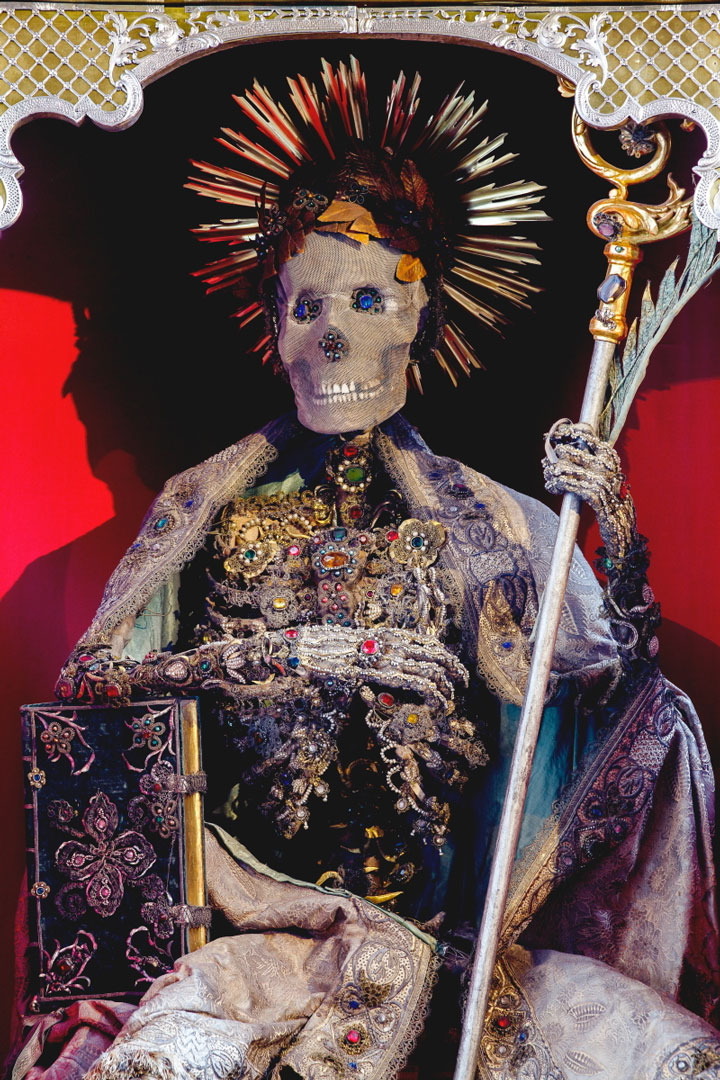

60
posted on
05/28/2015 6:58:35 PM PDT
by
caww
Navigation: use the links below to view more comments.
first previous 1-20, 21-40, 41-60, 61-80 ... 161-178 next last
Disclaimer:
Opinions posted on Free Republic are those of the individual
posters and do not necessarily represent the opinion of Free Republic or its
management. All materials posted herein are protected by copyright law and the
exemption for fair use of copyrighted works.
FreeRepublic.com is powered by software copyright 2000-2008 John Robinson
 This past weekend pope Francis canonized four new saints in a ceremony which received extra attention as two of the four were of Palestinian origin. One of the new Palestinian saints, Sister Mariam Baouardy (1846-1878), was a mystic and stigmatic also known as “Mary Jesus Crucified.” She was a Palestinian and foundress of the Discalced Carmelites of Bethlehem in the late 1800’s. The other new Palestinian saint, Sister Marie Alphonsine Danil Ghattas (1843-1927), was a co-founder of the Congregation of the Rosary Sisters, who spent much of her life in Bethlehem founding schools and orphanages.
This past weekend pope Francis canonized four new saints in a ceremony which received extra attention as two of the four were of Palestinian origin. One of the new Palestinian saints, Sister Mariam Baouardy (1846-1878), was a mystic and stigmatic also known as “Mary Jesus Crucified.” She was a Palestinian and foundress of the Discalced Carmelites of Bethlehem in the late 1800’s. The other new Palestinian saint, Sister Marie Alphonsine Danil Ghattas (1843-1927), was a co-founder of the Congregation of the Rosary Sisters, who spent much of her life in Bethlehem founding schools and orphanages.


 The biblical examples of prayer describe prayer being directed towards God alone. Not one prayer in the Psalms is directed towards the dead. Further, both Jesus (e.g.
The biblical examples of prayer describe prayer being directed towards God alone. Not one prayer in the Psalms is directed towards the dead. Further, both Jesus (e.g. 


